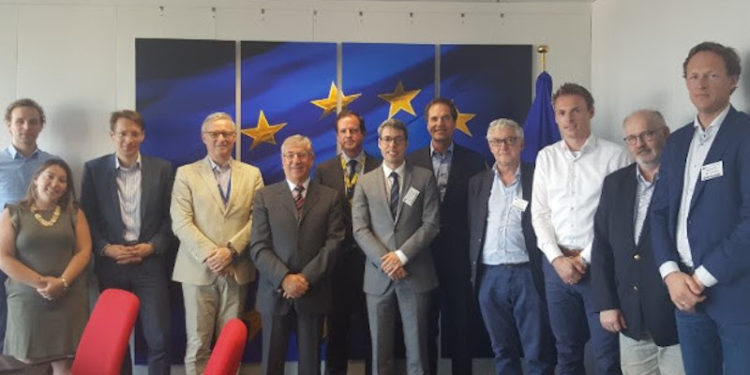A delegation from Europêche met EU Commissioner Karmenu Vella to discuss the main topics at the top of the political and legislative fisheries agenda in the EU. Both Commissioner Vella and Europêche credited the great progress in achieving sustainable fisheries with 97% of landings in the North East Atlantic from EU managed stocks fished at Maximum Sustainable Yield (MSY) levels.
The industry voiced support for Commissioner Vella to continue proposing necessary legislation to implement the Common Fisheries Policy (CFP), but called for rational policies which take into consideration socio-economic aspects and that can be implemented in practice.
During the discussion on fishing opportunities, both Commissioner Vella and Europêche representatives welcomed the positive results yielded by the CFP, leading to higher levels of supply, better competitiveness and higher incomes for fishermen. Rpresentatives put the focus on the need to concentrate efforts in the main target stocks to achieve MSY levels as quickly as possible, while the fishing sector requested more flexibility in terms of time and due consideration to socio-economic consequences of TAC cuts ahead of the Council negotiations.
‘I am pleased to observe that both the European Commission (EC) and the sector agree that the CFP performance indicators cannot be solely based on the number of stocks fished at MSY levels but more comprehensively on the achievement of economic, social and environmental objectives contributing to the availability of food supplies,’ commented Europêche President Javier Garat.
As regards the external dimension of the CFP, the delegation requested linking the negotiation of sustainable fisheries partnership agreements (SFPAs) with third countries to RFMO discussions. Concerning the Indian Ocean Tuna Commission (IOTC), Europêche voiced its appreciation of the efforts made by the EC to safeguard the fishing rights of the EU sector and encourage them to continue working along this line.
Europêche also praised EC’s efforts to become a party to the North Pacific Fisheries Commission (NPFC) which is urgently needed as of July 2018. However, the outcome of ICCAT negotiations was unsatisfactory since the sector expected greater quotas for bluefin tuna and the adoption of a management plan in view of the positive scientific assessment.
Regarding the development of an international legally binding instrument under UNCLOS on the conservation and sustainable use of marine biological diversity of areas beyond national jurisdiction (BBNJ), the sector expressed its rejection to include commercial fisheries under the scope of the new instrument as well as the possible establishment of a new overarching international body since fishing on the high seas is adequately regulated and governed by existing RFMOs.
Furthermore, the industry representatives especially welcomed the new mandate to renew the SFPA and implementing Protocol with Morocco that will expire on 14th July 2018.
‘Europêche representatives trust that a new agreement can be signed by both parties on fair terms, respecting international Law and improving the technical conditions for our operators before the expiry date. The industry stressed the need to renew important fisheries agreements with Guinea-Bissau, Gabon and Equatorial Guinea to consolidate a strategic network of SPFAs,’ Javier Garat said. ‘We request the launching of negotiations with Mauritania as soon as possible and want to highlight the added value created locally by the fishing industry in the country by the opening of a new factory to process fish for human consumption, much of which is sold in different African markets.’
Europêche also stressed the importance of strong and quick actions from the EC to unlock the long- standing issue with Norway on snow crab fishing in the Barents Sea.
Coming back to European waters, the sector also referred to the legislative developments on a new regulation for the conservation of fishery resources which regulates how, where and when fishermen may fish. The industry called for maximum flexibility in order to comply with the landing obligation and achieving MSY levels by 2020, stating that both the Technical Measures Regulation and Multiannual Plans (MAPs) aim to achieve ‘good environmental status’ of the stocks as defined by the Marine Strategy Framework Directive (MSFD). The industry stressed that MSFD should not supersede the CFP and therefore if a stock is within the objectives of the CFP, it should be considered as healthy under the environmental policy.
Considering MAPs, the EC recently published a Plan for the Western Mediterranean as well as for the Western Atlantic. Europêche expressed that some adjustments were needed and committed to work with the EC in a concerted effort to ensure a reasonable and practical result.
In addition, the landing obligation is still seen as impracticable for some demersal fisheries, for which several actions, more data on choke species and full utilisation of the flexibility measures were called upon by the industry, in order to continue operating in 2019.
Europêche also expressed concerns about the new proposal for a Directive on Port Reception Facilities, as it requires all fishing vessels to pay a fee to the port irrespective of whether they generate waste or not. As many fishing vessels participate in active and passive fishing for litter schemes, they can hardly be punished for offering an environmental service to society; cleaning the seas.
Lastly, Commissioner Vella was applauded for the success in fighting illegal exports of glass eel to Asia.
‘Europêche welcomes the EC position against an eel fishery ban which would be counterproductive since it would eliminate the eel restocking programmes in which our fishermen participate,’ Javier Garat said.









